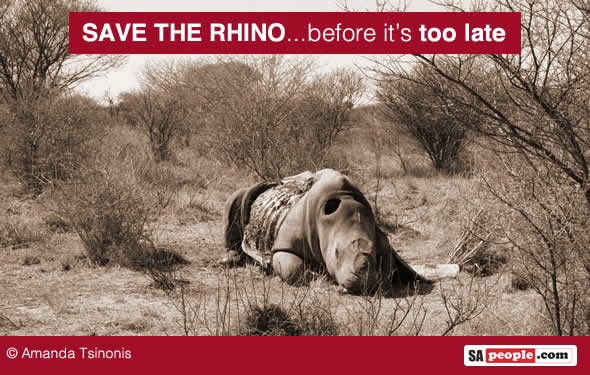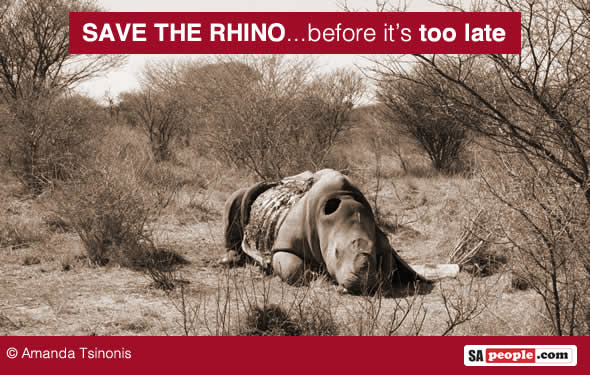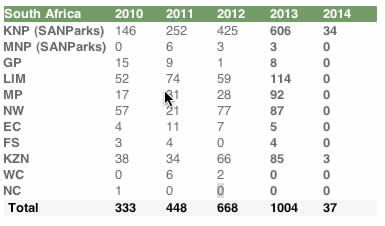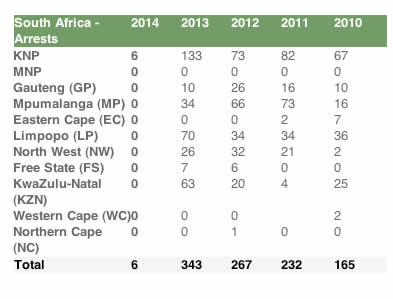
New Rhino Poaching Stats in South Africa are Shocking
The South African government has released a statement today that the total number of rhino poached in South Africa during 2013 increased to 1004. That’s almost three a day! The number of people arrested for rhino poaching-related offences climbed to 343. The figures, released by the Department of Environmental Affairs, are heartbreaking and shocking. Already a […]

The South African government has released a statement today that the total number of rhino poached in South Africa during 2013 increased to 1004. That’s almost three a day! The number of people arrested for rhino poaching-related offences climbed to 343.

The figures, released by the Department of Environmental Affairs, are heartbreaking and shocking.
Already a total of 37 rhino have been poached since the start of 2014. That’s in TWO AND A HALF WEEKS!
According to the World Wildlife Fund, only 13 were poached in the whole of 2007, making it an increase of over 7,000 % in the past six years.
The Kruger National Park continues to be the hardest hit by rhino poaching, losing a total of 606 of the iconic animals to poachers during 2013.
During 2012, 668 rhino were poached, while 448 were killed in 2011. Since 2008, 2 778 rhino have been poached in South Africa.
“The number of rhino poachers arrested during 2013 increased considerably with 343 being arrested, 133 of them in the Kruger National Park. In 2012, 267 alleged poachers were arrested. Since the beginning of 2014, 6 alleged poachers have been arrested,” according to the statement.
The Problem
“Bogus medicinal claims in the Far East have led to a deadly spike in poaching,” says Will Travers, CEO of the Born Free Foundation. “The consequences are tragic – both for the rhino themselves and for the people who, in some cases, have dedicated their lives to protecting them.”
The Solutions
He outlines three basic strategies that are required urgently:
a. We need to properly equip and resource the wildlife law enforcement agencies charged with protecting wildlife against criminal activities.
b. We need to address the demand for such products (ivory, lion and tiger parts, rhino horn, etc.) in consumer countries such as Vietnam, Lao PDR, China and Thailand.
c. We need political will in the source countries to back up the rangers and make sure that the judiciary treats wildlife crime as a serious crime by imposing deterrent sentencing. We also need political will in the consumer countries to change legislation to protect wildlife species from the ravages of trade and to actively change public attitudes towards the consumption of wildlife products.
As far as the third strategy is concerned, in February world leaders from about 50 countries will gather in London for a summit on wildlife crime that has been organised by Prince Charles and UK Prime Minister David Cameron. The aim of the summit is to produce a declaration of political commitment to a co-ordinated global response to illegal wildlife trade. The commitment would entail improving law enforcement and the role of the criminal justice system, reducing the demand for poached and illegal wildlife products, and to develop sustainable alternative livelihoods.
Rhino Poaching Statistics in South Africa

Rhino Poaching Arrests in South Africa

South Africans are urged to report incidents of poaching and tip-offs to the anonymous tip-off lines 0800 205 005, 08600 10111 or Crime-Line on 32211.
